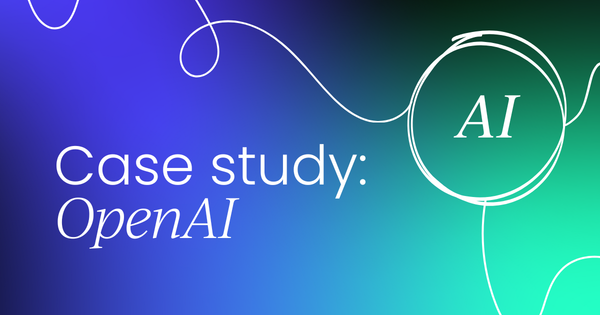OpenAI: The $300 billion frontier, anchored in the UK
The global AI landscape in 2025 is defined by an intense, multi-front war for supremacy among foundational model builders: OpenAI, Google DeepMind, Anthropic, and Mistral AI. While OpenAI continues to lead in overall scale, user base, and revenue (projected near $12 billion in 2025), its success is increasingly reliant on international partnerships.
The UK - with its world-class research talent and robust regulatory environment - has become a critical strategic anchor, moving from a key market to a sovereign partner. The UK's biggest challenge isn't a lack of talent or adoption, but securing the sovereign compute infrastructure required to manage and deploy frontier models domestically without relying entirely on foreign cloud architecture.
What OpenAI has done for the UK in 2025
This year, OpenAI doubled down on its commitment to the UK, focusing on sovereign infrastructure and public sector adoption. This work is fundamentally important for building trust and mitigating the "data residency" and "governance" barriers that slow enterprise adoption.
Key 2025 milestones in the UK:
- Sovereign AI infrastructure (Stargate UK): OpenAI, in partnership with NVIDIA and NScale, began advancing plans for Stargate UK. This massive build aims to deploy up to 31,000 NVIDIA GPUs over time, providing UK sovereign compute power. This is crucial for giving UK institutions and enterprises control over where their AI training and inference happens.
- Strategic government partnership: OpenAI signed a Memorandum of Understanding (MOU) with the UK Government to drive AI adoption across public services. This led to tangible deployments, including:
- Ministry of Justice (MoJ): Rolled out ChatGPT Enterprise access to civil servants for tasks like transcription and document analysis, following a successful pilot.
- Whitehall AI Assistants: OpenAI technology now powers internal tools like 'Humphrey' (for civil service admin) and 'Consult' (for speeding up public consultation sorting).
- UK data residency: OpenAI introduced the option for British customers (using ChatGPT Enterprise or API Platform) to host their data on UK servers. This move directly addresses major privacy and compliance concerns for regulated sectors like finance and healthcare.
This dedication has paid dividends: the UK is now reported to be a top-three global market for paying ChatGPT subscribers, API developers, and business customers, cementing its status as an AI adoption leader.
Global deployment strategy: scale, sovereignty, and sector
OpenAI’s global strategy is a three-pronged push for scale, reliability, and security:
- Hyperscaler backbone: The core strategy is to run its most advanced workloads on world-class infrastructure. This was massively accelerated in 2025 by a multi-year, multi-billion-dollar strategic partnership with AWS, utilizing Amazon EC2 UltraServers featuring hundreds of thousands of NVIDIA GPUs. This ensures the necessary compute scale for training GPT-5 and beyond.
- Geopolitical sovereignty: Recognizing that countries are wary of foreign entities holding sensitive data, OpenAI's partnership in the UK (and similar ventures like the Stargate expansion in Michigan, US) is designed to create local, trusted data residency and compute options. This addresses geopolitical and regulatory demands, ensuring continued access to non-US markets.
- API ecosystem dominance: OpenAI continues to expand its ecosystem via the API Platform (now seeing over 2.2 billion daily calls) and the GPT Store (hosting 3 million custom GPTs), leveraging a decentralized army of developers to deploy their models into every conceivable sector worldwide.
Technical advantages over competitors in 2025
The core battle in 2025 remains between OpenAI, Google DeepMind (Gemini), and Anthropic (Claude). OpenAI retains its market leadership through sheer scale, while competitors push specific safety and context boundaries.
OpenAI’s major advantage is its push into Agentic AI and its GPT Builder ecosystem, allowing users to create autonomous software agents easily. It continues to compete directly on foundational model performance while rapidly securing the hardware needed (via AWS and Stargate) to maintain its global scale advantage.
What’s next for OpenAI in 2026: The agentic era
For 2026, the focus will shift from just building powerful models to building powerful systems capable of complex, autonomous action.
- The Agentic SDK: OpenAI will continue to prioritize the rollout and maturation of its Agents SDK, allowing developers to create reliable, long-running AI agents that can interact with external software (APIs, databases) without human intervention. This will move AI from being a co-pilot to a true virtual employee.
- Global infrastructure competition: The race with competitors like Google and Anthropic will turn heavily on physical deployment. The successful commissioning of the UK Stargate infrastructure will be a key moment, determining how quickly sovereign AI capabilities can be brought online across Europe.
- The content war: Following the success of its video model Sora in 2025, OpenAI will push its multimodal capabilities further, integrating video, audio, and reasoning into a unified platform that challenges traditional media creation and consumption platforms.
Must-attend: Architecting production-grade Generative AI
The challenge for enterprise leaders is no longer whether AI works, but how to deploy and govern it reliably at scale. OpenAI's technical leadership is coming to London to share the architectural secrets that support their multi-billion-dollar enterprise platform.
Why you must attend:
This session is a crucial opportunity for technical and executive leaders to understand the transition from pilot projects to production reality with frontier models:
- Conquering deployment blockers: Learn best practices directly from OpenAI on managing vast API traffic, optimizing inference costs, and securely connecting LLMs to proprietary enterprise data.
- The trust mandate: Understand OpenAI’s approach to security, including new data residency options and content labeling, essential for securing customer trust in highly regulated UK sectors like finance and government.
- Building the future of work: Gain clarity on the Agentic AI roadmap and how to structure your internal teams and IT architecture to successfully integrate autonomous, reasoning systems into core business processes in 2026.
Secure your seat to learn the operational blueprints from the company defining the world's AI infrastructure. Register for Generative AI Summit London today.




 Follow us on LinkedIn
Follow us on LinkedIn
